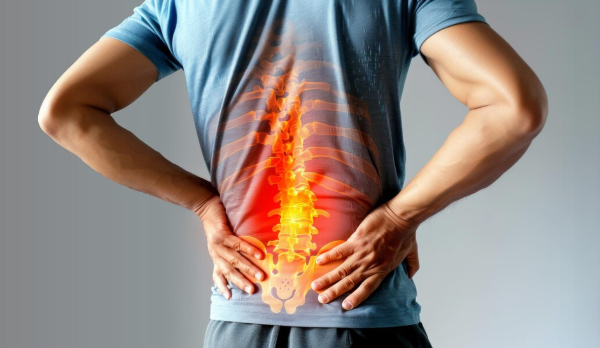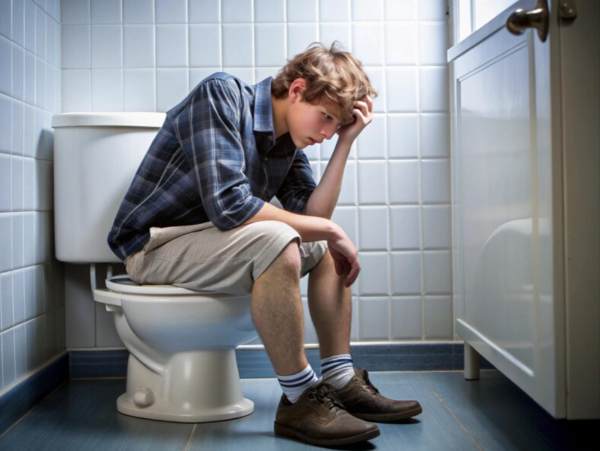Have you ever experienced persistent lower back pain and wondered if it could be related to your digestive issues? I can assure you that there is a surprising connection between constipation and lower back pain.
Yes, constipation can cause lower back pain due to the pressure and strain from hard stools or bloating, affecting the surrounding muscles and nerves.
In this comprehensive article, we’ll explore the underlying mechanisms, common causes, and effective strategies to address this often-overlooked link.
Constipation is a common gastrointestinal condition characterized by infrequent or difficult bowel movements. It can be caused by a variety of factors, including diet, lifestyle, and underlying medical conditions.
On the other hand, lower back pain is a widespread musculoskeletal issue that can have various origins, ranging from poor posture to injuries.

How Constipation Can Lead to Lower Back Pain?
- Increased Abdominal Pressure: When stool accumulates in the colon due to constipation, it can put pressure on the surrounding muscles and organs, including the lower back.
- Muscle Strain: The straining and pushing required during a bowel movement can lead to muscle strain and spasms in the lower back.
- Referred Pain: The nerves that supply the lower back and the digestive system are interconnected, so pain from constipation can be felt in the lower back.
- Postural Changes: Chronic constipation can cause individuals to adopt a hunched posture, which can contribute to lower back pain.
The Connection Between Constipation and Lower Back Pain
While the connection between constipation and lower back pain may not be immediately obvious, research has shown that there is a strong relationship between the two.
When the digestive system is not functioning optimally, it can have a direct impact on the musculoskeletal system, including the lower back.
Treating Constipation and Relieving Lower Back Pain
- Dietary Changes: Increasing fiber intake, staying hydrated, and incorporating more physical activity can help alleviate constipation.
- Over-the-counter remedies: Laxatives, stool softeners, and other over-the-counter medications can provide short-term relief for constipation.
- Pelvic Floor Therapy: Working with a physical therapist to strengthen and coordinate the pelvic floor muscles can be beneficial for constipation and lower back pain.
- Prescription Medications: In some cases, healthcare professionals may prescribe medications to address chronic constipation.
Common Causes of Constipation
- Dietary Factors: A diet low in fiber, dehydration, and a lack of physical activity can all contribute to constipation.
- Medications: Certain medications, such as pain relievers, antidepressants, and blood pressure medications, can have constipation as a side effect.
- Underlying Medical Conditions: Conditions like irritable bowel syndrome (IBS), diabetes, and thyroid disorders can lead to chronic constipation.
- Pelvic Floor Dysfunction: Weak or uncoordinated pelvic floor muscles can impair the normal functioning of the bowels.

Symptoms and Signs of Constipation-Induced Lower Back Pain
- Persistent or recurrent lower back pain
- Difficulty or straining during bowel movements
- The feeling of incomplete emptying after a bowel movement
- Abdominal discomfort or bloating
- Irregular or infrequent bowel movements
- Decreased appetite or loss of appetite
Prevention Strategies for Constipation and Lower Back Pain
- Maintain a Balanced Diet: Ensure a regular intake of fiber-rich foods, such as fruits, vegetables, whole grains, and legumes.
- Stay Hydrated: Drink plenty of water and other fluids throughout the day to support digestive and overall health.
- Exercise Regularly: Engage in physical activities that promote bowel regularity and strengthen the core and back muscles.
- Manage Stress: Incorporate stress-reducing techniques, such as meditation, yoga, or deep breathing, as chronic stress can contribute to both constipation and lower back pain.
When to Seek Medical Help for Constipation and Lower Back Pain
If you experience persistent or worsening constipation and lower back pain, it’s essential to consult with a healthcare professional.
They can perform a thorough evaluation, identify the underlying causes, and develop a comprehensive treatment plan to address your specific needs.
Lifestyle Changes to Promote Digestive Health and Prevent Lower Back Pain
- Establish a Consistent Bowel Routine: Set aside time each day for a relaxed and unhurried bowel movement.
- Incorporate Fiber-Rich Foods: Gradually increase your intake of high-fiber foods, such as whole grains, fruits, vegetables, and legumes.
- Stay Physically Active: Engage in regular physical activity, such as walking, swimming, or low-impact exercises, to support digestive and musculoskeletal health.
- Manage Stress: Practice stress-management techniques, such as meditation, yoga, or deep breathing, to help alleviate both constipation and lower back pain.
Conclusion
In conclusion, the connection between constipation and lower back pain is a crucial yet often overlooked aspect of overall health.
By understanding the underlying mechanisms, addressing the common causes, and implementing effective prevention strategies, we can take proactive steps to maintain a healthy digestive system and prevent the development of persistent lower back pain.
If you’re struggling with constipation and lower back pain, don’t hesitate to reach out to a healthcare professional. They can provide personalized guidance and support to help you find lasting relief and improve your overall well-being.
Remember, taking care of your digestive health is the first step towards a healthier, pain-free back.
Related Topic:
.
